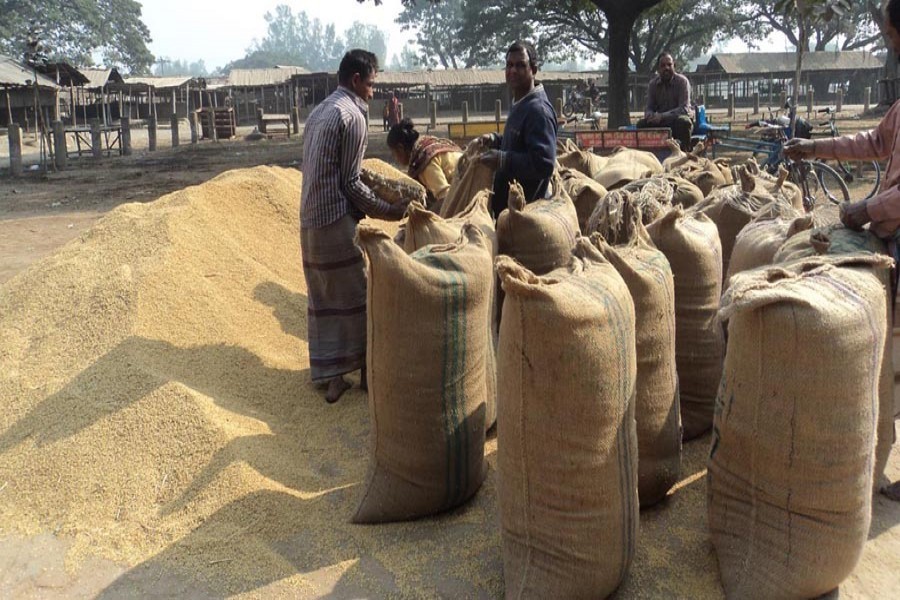The government Sunday declared Aman-procurement drive from November 7, raising the rice price by Tk 4.0 and paddy's by Tk 1.0 per kilogram from last season's rates.
Meanwhile, a fresh spike in prices of rice and paddy precedes the government declaration on Aman procurement, sources said, though harvest of the crop has already started in many places across the country.
The government has decided to buy a total of 0.8 million tonnes of rice and paddy from farmers and millers from November 7 under the Aman-procurement drive this season to replenish public food stock.
The asking price for 0.5 million tonnes of rice has been fixed at Tk 40 per kg for the drive, marking a Tk 4.0 hike compared to that of last year.
The rate for 0.3 million tonnes of paddy has also been increased by Tk 1.0 a kg to Tk 27.
The procurement decision came from a virtual meeting of the Food Policy and Monitoring Unit (FPMU), chaired by Food Minister Shadhan Chandra Majumder.
Agriculture Minister Dr Abdur Razzaque, Finance Minister A H M Mustafa Kamal, Commerce Minister Tipu Munshi, Fisheries and Livestock Minister S M Rezaul Karim, and State Minister for Disaster Management and Relief Dr Enamur Rahman also spoke at the meeting.
The food minister said, "The government aims at ensuring fair prices for farmers as well as increasing stocks for better food security of consumers."
He expressed the hope that the Aman-procurement drive would be successful as the previous one in Boro season.
Meanwhile, the Ministry of Agriculture is expecting 15.5 million tonnes of rice production this Aman season.
According to the Director General of Food, the Aman-procurement drive was almost a disaster last year as it could purchase less than 10 per cent of the targeted 0.8 million tonnes of rice and paddy.
The asking price for rice was Tk 36 a kg, and for paddy it was Tk 26 last year. The government rates were much lesser than the then market prices, which led to a failure in grain purchase, said officials.
A senior official at the directorate told the FE that the government-set prices have been determined by taking into account probable production costs and existing market prices of the staple grain.
He noted that lower import-duty facility for rice was also withdrawn from October 30 to help farmers get good prices for their crop during this Aman-harvest season.
Meanwhile, harvest of Swarna and hybrid varieties of paddy has begun in a few places across the country. Newly collected paddy was selling at Tk 23.5-24 a kg (Tk 940-960 a maund), according to Bangladesh Auto Major Husking Mill Owners Association (BAMHMOA).
However, prices of both stored paddy and rice of Boro season witnessed a Tk 60-100 hike a maund in the last few days, which traders attributed to reinstatement of the import duty from October 30.
Rice of BRRI Dhan 28, 29 and Miniket varieties witnessed a Tk 1.5-2.0 hike a kg- both in wholesale and city retails in the last few days.
The Trading Corporation of Bangladesh (TCB) recorded 3.0-3.5- per cent hike in rice prices in a week.
Shahidur Rahman Patwary, a Dinajpur-based miller and executive member of the BAMHMOA, told the FE that asking price for rice should be Tk 42 a kg, considering the price of Tk 27 a kg for paddy.
He said, "The season of paddy has started with Tk 930 a maund this Aman season, which indicates that the market would remain much vibrant for the next few months."
The government would have to struggle to buy paddy from farmers if the market price crosses Tk 1,000 a maund (Tk 25 a kg).
Value-chain expert Prof Golam Hafeez Kennedy said the government should have the preparation to review its purchase prices timely - following any odds - to fulfil domestic procurement target.
He noted that it was a good sign that the prices of paddy did not fall, as the government had slapped a cap on import. It would help encourage farmers to go for rice production in next seasons.
"The government should maximise its domestic procurement to 2.0-2.5 million tonnes in every rice season to help commoners get the staple at affordable prices," he added.
According to the Ministry of Food, the country now has 1.52 million tonnes of food in stock, of which rice comprises 1.4 million tonnes.
The government and private sector imported a total of 690,000 tonnes of rice in the first four months of this financial year, 2021-22.


